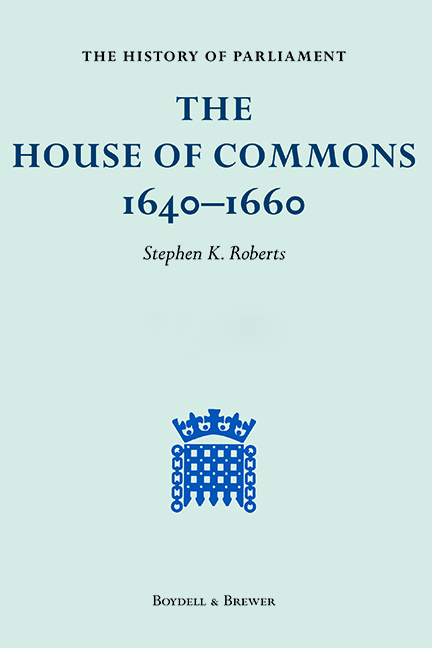 The History of Parliament: The House of Commons 1640-1660 [Volume VIII]
The History of Parliament: The House of Commons 1640-1660 [Volume VIII] Members Radclyffe – Thistlethwayte
Published online by Cambridge University Press: 30 May 2023
Summary
Radclyffe, Richard (1607-57), of Radcliffe Hall, Manchester, Lancs.
Manchester 1656
bap. 30 Aug. 1607, 1st s. of William Radcliffe of Radcliffe Hall, Manchester, and Elizabeth (bur. 22 May 1660), da. of James Bradshaw of Darcy Lever, Lancs. m. 13 Feb. 1636, Millicent (bur. 12 Feb. 1652), da. of Sir John Gell of Hopton, Derbys., 4s. 5da. (2 d.v.p.). suc. fa. July 1645. bur. 3 July 1657.
Civic: bailiff, Manchester by 1635-aft. 1638. Scavenger, Manchester ct. leet 1636-7; overseer of conduit, 1647-d.; affeerer, 1647-8, 1651-2, 1653-5, 1656-d.; boroughreeve, 7 Oct. 1651-12 Oct. 1652. Freeman, Liverpool 7 Nov. 1644-d. Feoffee, Manchester g.s. 6 Mar. 1648-d.
Military: capt. of ft. (parlian.) 13 July 1642-aft. July 1644; maj. by Nov. 1644-bef. June 1650.
Estate: Radclyffe’s great-grandfather’s estate included Radcliffe Hall and two burgages and other lands in Manchester.
Will: not found.
Radclyffe belonged to a junior branch of a family that had been established in the Manchester area since the fourteenth century. By the Elizabethan period, the Radcliffes had taken up residence in a moated house known as Radcliffe Hall – later called Pool Fold – near Market Stead Lane, Manchester (the modern Cross Street). Radclyffe’s father, grandfather and great-grandfather all figured prominently in the town’s affairs as burgage-holders and officers of the manorial court leet, and all were styled ‘gentleman’ in the court’s records.
Radclyffe, too, emerged as one of Manchester’s most prominent inhabitants; and such was his ‘quality’ that he was able to secure a match with a daughter of the Derbyshire knight Sir John Gell. Gell was a trenchant Calvinist and a patron of godly ministers, and Radclyffe’s marriage into the family strongly suggests that he was also a man of godly convictions. His parliamentarian allegiance during the civil war also points in this direction. In a letter to Gell of early July 1642, he saw the threat by Lancashire’s royalist lord lieutenant, James Stanley, Lord Strange to attack Manchester as ‘merely digitus dei [the finger of God], to move men’s hearts to stand to so good a cause, protesting to spend the last drop of blood before the town should suffer or my lord take away their goods’.
- Type
- Chapter
- Information
- The History of Parliament: The House of Commons 1640-1660 [Volume VIII]Members, Radclyffe – Thistlethwayte, pp. 1 - 978Publisher: Boydell & BrewerFirst published in: 2023


